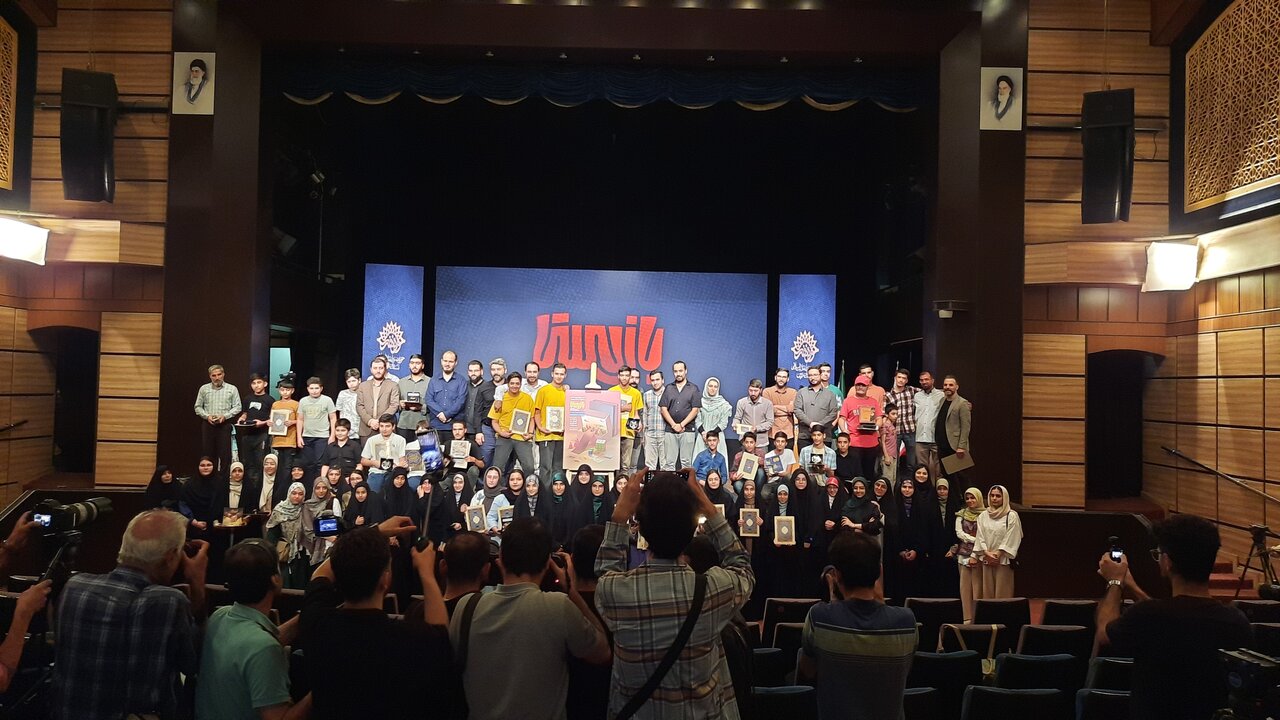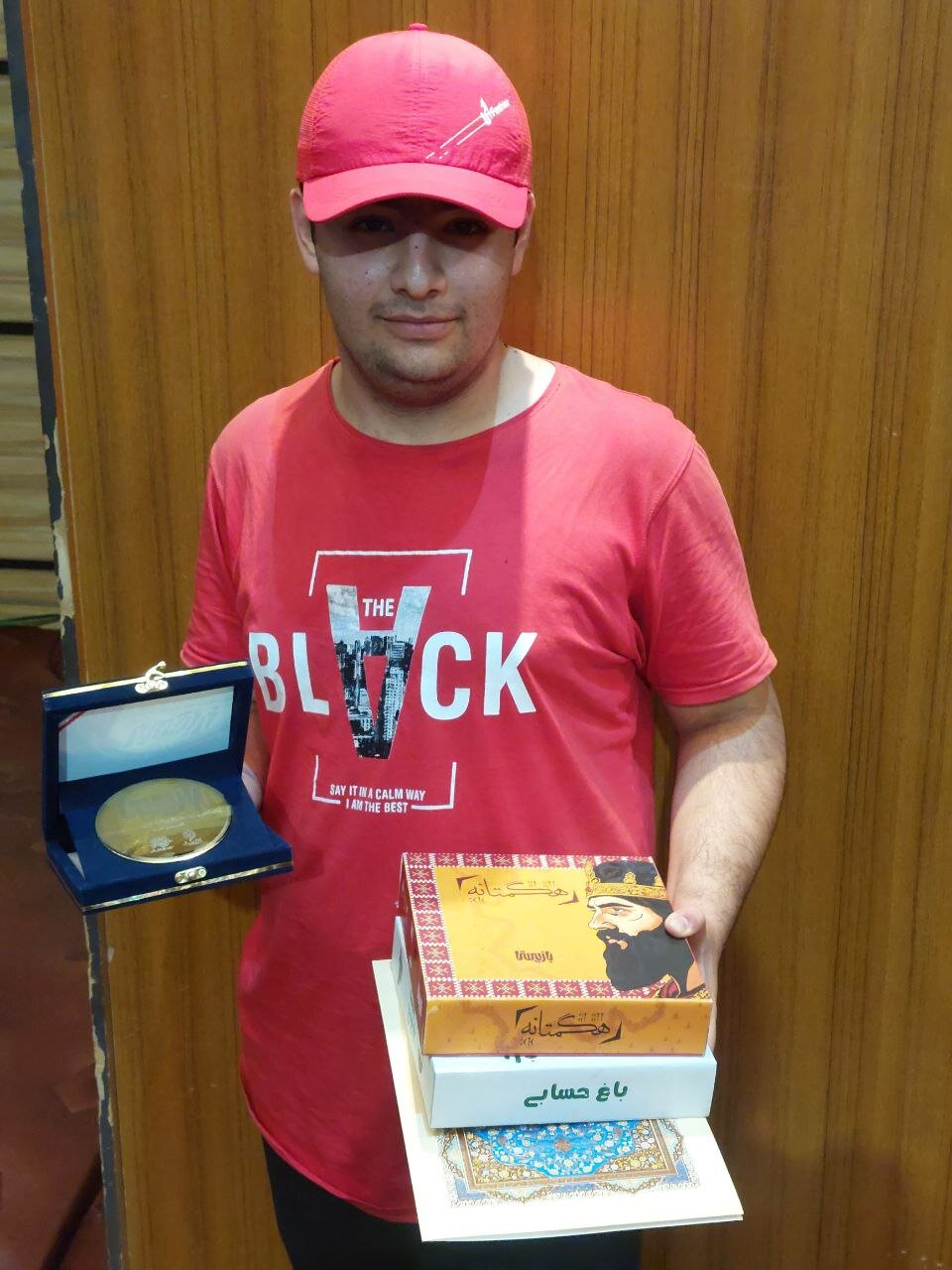Young minds, big ideas: Baazista empowers next generation of game designers

TEHRAN – The closing ceremony of the first national game-scriptwriting event “Baazista” was held on August 4, at the Art Bureau in Tehran, with the announcement of the event’s winners.
Although the initial purpose of Baazista was to focus on game scripts, the enthusiasm shown by the participants changed the course of the event and led to the creation of several board games, environmental games, and escape rooms.
At the beginning of the ceremony, Mohammadreza Emamgholi, secretary of the event, gave a report on the event's proceedings and said: “The presence of nearly 3,800 participants from all over Iran and the submission of around 3,000 entries showed the high energy and enthusiasm surrounding this event. In total, 444 teams registered for Baazista. Of the submitted entries, 249 game designs entered the judging stage, and eventually 15 board games and 9 environmental games and escape rooms made it to the final stage”.
Appreciating the judges and mentors’ efforts, he said: “Without their cooperation, it wouldn't have been possible to complete this two-year journey. This first edition is not the end of the road, and we hope that with the support of officials, such events will continue”.
Later, Hamed Taammoli, one of the judges of Baazista, said: “During the two days of judging, we truly enjoyed the quality of the games. I hope you, the participants, continue to develop your games into marketable products with thought and motivation”.
Also speaking at the ceremony, Seyyed Amir Javid, Deputy Head of the Art Bureau for International Affairs, addressed the attending youth and said: “Your work was excellent and truly uplifting for us. I honestly regret that I didn’t have such opportunities when I was a teenager”.
“Teenagers may think their work has no impact on major issues like war, but you should know that what you’re doing in Baazista can help untangle critical challenges in future conflicts. The scenarios of future wars will require impactful games—ones that can prepare decision-makers to handle various situations. You are the real heroes who, with your thoughts and big ideas, can shape the country’s future and make a difference,” he added.
Ali Janbaz, Director of the Children and Adolescents Department at the Art Bureau, also spoke during the closing ceremony and said: “At the Children and Adolescents Department of the Art Bureau, serious efforts are being made to give special attention to the topic of games. Board games are a valuable form of entertainment that can drive us forward”.
“We already have solid technical infrastructure in this field, and we have a strong international standing in graphic design and printing. We also have good potential for exporting games to regional countries and, compared to some regional competitors, we are ahead. We can develop collaborations and exchanges with other countries,” he noted.
“If serious work is done in the field of games and entertainment, it can yield significant and impactful results. This generation is very pragmatic. And let’s not forget—it wasn’t just the teenagers who accomplished all this. Much of this success is the result of the dedication of passionate mentors who taught you how to learn and grow. We must all join forces to solve the challenge of entertainment in Iran,” he emphasized.
In the last part of the closing ceremony, the winners of various categories received their awards. The finalists came from 10 provinces, including Qazvin, Yazd, Gilan, Qom, Hamedan, Khorasan Razavi, Isfahan, Fars, Semnan, and Tehran.
At the end of the ceremony, the poster for the second edition of the event was unveiled. It is set to start in September across Iran.
In an interview with the Tehran Times, Ali Janbaz spoke about choosing the fields of board games, environmental games, and escape rooms for the national Baazista event.
“At first, we planned to hold this event solely in the field of game scriptwriting. We thought we could expand this emerging industry in Iran, starting from stories and narratives, believing that children and teenagers—with their complex yet playful minds—could greatly contribute. But the efforts and activities of the participants led us from stories to final products,” he said.
“I also believe that intellectual games are more effective in our country compared to other types, such as computer, mobile, or online games. These games are family-oriented and promote cohesion within the family, moving children away from individualism. Board games offer a collective entertainment experience in real life, which is an important aspect,” he added.
“In terms of domestic capabilities, we also have a competitive edge in this field in the region. While we may not be highly advanced in the video game industry, when it comes to board games, Iran is well-known in the region for its printing industry, has world-class illustration and graphic design, and possesses rich ancient narratives and stories. These strengths give us the potential to move toward exporting such games,” Janbaz asserted.
“Baazista is a starting point for growth and empowerment, which could lead, in ten years, to the formation of a professional community of game designers,” he underlined.
Regarding support for games designed by teenagers, he said: “At the Children and Adolescents Department at the Art Bureau and the Omid Innovation Center, affiliated with the Art Bureau, we are working on establishing a Fund for Games and Entertainment. Last year, we supported 20 games designed by adults and provided funding for them”.
“In terms of distribution, we are working on expanding our regional connections. We also support games by teenagers so they can be seen. Mass production opportunities for some of these games are facilitated by other organizations. For the rest, as long as they meet quality standards, we try to help provide the conditions for production and market entry,” he explained.
On the issue of the limited audience for such games in the country, Janbaz said: “Promoting the use of these games can be done through schools.” He also announced the launch of the Baazista Games League next year, where each participant in the current event can act as an ambassador to help expand the field”.
Speaking to the Tehran Times, Seyyed Ali Tabatabaei, one of the event's judges and mentors, commented on the quality of the submissions and the challenges of judging. “One of our challenges was the high quality of the games. Thanks to a continuous mentorship process over the past two years—where participants could ask questions from mentors online and, where possible, attend in-person sessions—the final games reached a high level of quality”.
“The addition of several graphic designers to the event also elevated the visual quality of the games. These factors made it difficult to choose the best ones. We've participated in similar events before, and I can say the level of this event was higher than others. Even games that didn't win here could have won in other competitions,” he added.
About the ideas and prototypes from participants, he said: “All participants were students, and for most of them, this was their first experience designing a game, so naturally, there were flaws. The key point is that the mentors didn't excessively intervene; they just pointed out some aspects, and the students themselves tried to improve their work through effort, research, playing other games, and seeking advice”.
“Game design, aside from its knowledge component, is a creative endeavor. Kids might have more creativity than older age groups. The positive transformation occurred when this creativity merged with knowledge, resulting in games that are now ready for production. I believe all of them could enter the market within the next six months,” he concluded.
Hossein Beigi, an 18-year-old student from Qazvin and the winner of the Most Creative Board Game award for his game “Hegmataneh,” spoke to the Tehran Times about his game: “It is a two-player strategic war game based on the conflict between the Medes and the Assyrians”.

Hossein is one of the few participants in the event with more experience in game design. He was introduced to board games at the age of seven, developed an interest in designing them, and has since designed several games. “Hegmataneh” is the second of his games to be presented as a finalized product.
On choosing the name “Hegmataneh” for his game, he said: “I'm planning a series of games under the title ‘Persian Empire,’ starting from the earliest dynasties of Iran, with each game focusing on a theme characteristic of that dynasty.
“A major historical event during the Median era was the establishment of a central government, which was founded in the city of Hegmataneh, considered the beginning of Iranian civilization. That’s why I chose it as the name,” he stated.
Regarding his next game in development, Hossein said: “Immortal Guard is the name of my next game, and the prototype has been designed. It focuses on the Achaemenid army”.
Baazista events are held with the aim of teaching game design, promoting non-digital games, and taking action on historical and national concepts. The jury for the first edition of the event included Fatemeh Alaeddin, Hamed Taammoli, Seyyed Ali Tabatabaei, and Ali Edriszadeh.
In the first edition of the Baazista, in addition to the virtual sessions, 3 in-person events were also held in the provinces of Qazvin, Gilan, and Yazd.
SS/SAB
Leave a Comment